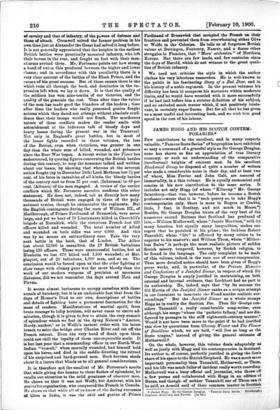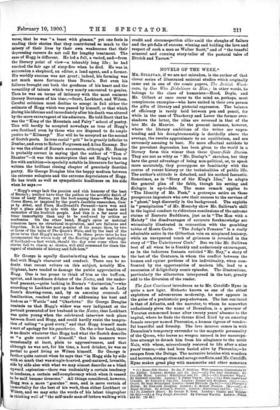JAMES HOGG AND HIS SCOTCH CONTEM- PORARIES.* FEW contributors to
the excellent, and in many respects valuable, "Famous Scots Series" of biographies have exhibited so easy a command of a graceful style as Sir George Douglas; none has shown so fine an appreciation of true literary economy, or such an understanding of the comparative (intellectual) heights of eminent men. In his excellent Blackwood Group he disposed of quite a number of writers who made a considerable noise in their day, and at least two of whom, Miss Ferrier and John Galt, are assured of immortality, in a thin volume. He is equally economical and concise in his new contribution to the same series. It includes not only Hogg (of whose " Kilmeny " Mr. George Saintsbury—that was, however, before he became a Scotch professor—wrote that it is "such poetry as, to take Hogg's contemporaries only, there is none in Rogers or Crabbe, little, I fear, in Southey, and not much in Moore.") Besides, Sir George Douglas treats of the very best of the numerous second Burnses that Scotland has produced of late,—William Motherwell, whose "Jeanie Morrison," with its many beauties, but equally many inequalities, makes one regret that he perished in his prime ; the luckless Robert Tannahill, whose "lilt" is affirmed by many critics to be superior to his master's; and William Thom, whose " Mither- less Bairn" is perhaps the most realistic picture of sodden Scotch misery, tempered, however, by Scotch religion, to be found in the language. The only complaint to be made of this volume, indeed, is the rare one of over-compression. Thus more detailed notice should have been given of Hogg's prose works, and, in particular, of the Private Memoirs. and Confessions of a Justified Sinner, in respect of which Sir George Douglas is amply justified in maintaining, on both external and internal evidence, that Lockhart had no part in its authorship. He, indeed, says that "by its success the Gil Martin of the Justified Sinner ranks as a unique attempt in our literature to incarnate the Fiend amidst realistic sur- roundings." But the Justified Sinner as a whole stamps Hogg as in reality the Scottish Poe. Then Sir George con- siders Tannahill a really considerable song-writer, even although his songs "abuse the pathetic fallacy,' and are dis- figured by passages in the stiff eighteenth-century manner." Would it not have been more to the point if he bad justified this view by quotations from Gloomy Winter and The Flower of Duntlane which, we are told, "will live as long as the Scots tongue," instead of giving the general estimate of Motherwell ?
On the whole, however, this volume deals adequately as well as justly with Hogg and his contemporaries in Scotland. Its author is, of course, perfectly justified in giving the lion's share of his space to the Ettrick Shepherd. He was a much more important personality than Tannahill, Motherwell, or Thom, and his life was much fuller of incident really worth recording. Motherwell was a busy official and journalist, who threw off a few poems and collaborated with Hogg in an edition of Burns, and though of neither Tannahill nor of Thom can it be said, as Arnold said of their common master in Scottish
• James Hogg. By Sir George Douglas. Frowns Scots Series." Edinburgh: Anderson, and Ferrier. [Ii. Cd.]
verse, that he was " a beast with gleams," yet one feels in reading their stories that they contributed so much to the misery of their lives by their own weaknesses that their depressing careers do not call for lengthy treatment. The case of Hogg is different. He led a fall, a varied, and—from the literary point of view—a tolerably long life ; he had reached the fair age of sixty-five when he died. He was in succession a shepherd, an editor, a land agent, and a farmer. His worldly success was not great ; indeed, his farming was not much more fortunate than Barns's. But even his failures brought out both the goodness of his heart and the versatility of talents which very nearly amounted to genius. Then he was on terms of intimacy with the most eminent literary Scotsmen of his time,—Scott, Lockhart, and Wilson.
Careful criticism mast decline to accept in fall either the estimate of Hogg which was passed by himself, or that which during his lifetime and immediately after his death was uttered by the more extravagant of his admirers. He told Scott that he was the "King of the Mountain and Fairy" school of poetry.
This will hardly be accepted nowadays as true of Hogg's own Scotland even by those who are disposed to do ample justice to " Kilmeny." Nor will he be accepted as the second of Scotch poets. In true racial " grit" he is greatly inferior to Dunbar, and even to Robert Fergusson and Allan Ramsay. But he was the ablest of Barns's successors, although Mr. Henley is probably correct in saying that the author of "Tam o' Shanter"—it was this masterpiece that set Hogg's brain on
fire with ambition—is specially notable in literature for having written the brilliant closing chapter of genuinely Scottish poetry. Sir George Douglas hits the happy medium between the extreme eulogists and the extreme depreciators of Hogg. He has truth as well as sympathetic kindliness on his side when he says :—
"Hogg's songs lack the passion and rich humour of the best of Burns's ; neither have they the pathos or the artistic finish of those of Lady Nairne, yet the best among them—When the Kye Comes flame, or inspired by the poet's Jacobite researches, Cant' ye by Athol, and Flora MacDonald's Farewell—have won and kept a place aide by side with the above in the hearts and memories of the Scottish people. And this is a far surer and truer immortality than any to be conferred by critics or academies On the other hand, Hogg's epics or metrical romances have no structural inspiration, and are failures and forgotten. It is by the most popular of his songs. then, by two or three of the tales of The Queen's Wake, and by the best of the prose tales that Hogg's name lives. In these prose tales he has incorporated the whole body of the floating popular mythology of Scotland—a fact which, should the day ever come when the stories fail to charm as stories, will still command for them the regard of students of history and folk-lore."
Sir George is equally discriminating when he comes to deal with Hogg's character and conduct. There can be no
doubt that recent writers on this subject, notably Mrs. Oliphant, have tended to damage the public appreciation of Hogg. One is too prone to think of him as the buffoon, egotist, and inordinate drinker of the Noctes, and the under-
bred peasant,--quite lacking in Burns's "distinction,"—who according to Lockhart pat up his feet on the sofa in Lady
Scott's drawing-room, and, by an amusing crescendo of familiarities, reached the stage of addressing his host and hostess as " Wattle " and "Charlotte." Sir George Douglas reminds us that Hogg's widow was very indignant at the portrait presented of her husband in the Noctes, that Lockhart was quite young when the celebrated interview took place
between Scott and Hogg, and could hardly resist the tempta- tion of telling "a good story," and that Hogg himself made
sort of apology for his gaucheries. On the other hand, there
is no doubt whatever that Hogg had what the Scotch describe as "a gude conceit o' himself," that his manners were occasionally at least, plain to aggressiveness, and that
although he was not, for his time, a hard drinker, he was as partial to good living as Wilson himself. Sir George is
further quite correct when he says that "in Hogg side by side With so much that was simple-hearted, good-natured, loveable, side by side also with what we may almost describe as a blind upward aspiration—there was undeniably a certain tendency to loudness, a certain self-complacency which when it ceased to be naïf became tiresome." All things considered, however, Hogg was a more "genuine" man, and is more certain of immortality for the best of his work, than either Lockhart or Wilson, and we may echo the words of his latest biographer in thinking well of "the self-made man-of-letters walking with credit and circumspection alike amid the sloughs of failure and the pit-falls of success, winning and holding the love and respect of such a man as Walter Scott," and of "the tuneful minstrel and cunning story-teller of the pastoral tales of Ettrick and Yarrow."



































 Previous page
Previous page